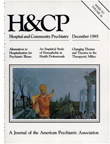Multiple Admissions to an Urban Psychiatric Center: A Comparative Study
Abstract
Based on data from medical records of an urban psychiatric center, 113 patients previously identified as having multiple admissions—three or more admissions in 365 days—were compared with 113 patients without multiple admissions who were matched for age, sex, and admission status. No significant differences were found between the two groups on such variables as racial-ethnic background, diagnosis, or living arrangements before and after their index hospital stay. However, patients with multiple admissions were significantly more noncompliant with medication and significantly more likely to abuse drugs or alcohol. They also were younger at their first hospitalization and had more previous hospital admissions, shorter lengths of stay, and more incidents of leave without consent than the patients who did not have multiple admissions.
Access content
To read the fulltext, please use one of the options below to sign in or purchase access.- Personal login
- Institutional Login
- Sign in via OpenAthens
- Register for access
-
Please login/register if you wish to pair your device and check access availability.
Not a subscriber?
PsychiatryOnline subscription options offer access to the DSM-5 library, books, journals, CME, and patient resources. This all-in-one virtual library provides psychiatrists and mental health professionals with key resources for diagnosis, treatment, research, and professional development.
Need more help? PsychiatryOnline Customer Service may be reached by emailing [email protected] or by calling 800-368-5777 (in the U.S.) or 703-907-7322 (outside the U.S.).



